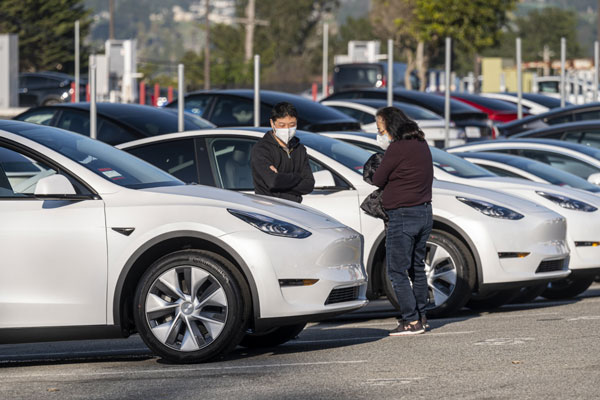Unintended Consequences of Self-Driving Cars
Sep 07, 2022 By Triston Martin
The subject of consequences of self-driving cars will attain public acceptability is not one of it, but doubt arise here is when. This is because there is no question of if they will. Google (GOOG), the Defense Advanced Research Projects Agency (DARPA), manufacturers, and academic institutions from across the globe are all working diligently to achieve this goal. The potential for widespread usage of driverless automobiles carries several benefits, including a reduction in automobile collisions and the economic toll inflicted by the resulting loss of life, injuries, or damaged property. As a result of these autonomous cars maximizing driving effectiveness and decreasing overcrowding, financial savings on energy expenses will also be realized. The potential positive impact on the economy as a whole might be substantial.
However, this does not imply that somehow there won't be any unexpected effects resulting from the transition toward autonomous cars.
First Negative Implication: Job Issues

People whose livelihoods depend on operating motor vehicles, such as automobiles, trucks, and buses, would unexpectedly find themselves without paid employment if self-driving technology becomes widespread. In 2019, the Census bureau of the United States of America estimated that there were over 2.0 million persons working as tractor-trailer truckers.
Three hundred seventy thousand four hundred people are drivers for taxis and delivery services, and more than 680,000 people are working as bus drivers in the United States. When taken as a whole, this indicates the possible destruction of far above 2.9 m employment, which is significantly greater than the number of jobs lost in 2008 due to the Great Recession. When you add in drivers of delivery and light trucks, which account for 1.5 million employees, the estimated number of jobs being lost rises to an astounding 4.5 million. After considering all of the managerial, administrative, and support personnel for these driving roles, the total number may be treble.
It will be challenging for these jobless employees to find new employment rapidly, and the expense of retraining them might be rather costly. It's feasible that in a few generations, very few people would even be able to operate a car, which would be a fascinating and perhaps disastrous outcome.
Second Negative Implication: Hackers Took Control of Vehicles
In earlier times, security professionals attempting to attack vulnerabilities in current vehicles have installed and been able to gain command. Their goal was to find vulnerabilities in modern automobiles and exploit such vulnerabilities. The technology and software of a system would handle all of the driving duties in an autonomous vehicle. A hostile attacker may locate and leverage security weaknesses in several complicated systems to seize control of a vehicle or even intentionally cause it to collapse.
In addition, it is anticipated that autonomous automobiles of the coming times will be interconnected so that they may speak with one another and transmit and receive information about other vehicular traffic. Attacks on a network of this kind may bring to a grinding stop all these robotic cars currently driving around.
Naturally, the manufacturers of autonomous vehicles are paying personnel to attempt to uncover and fix any security flaws they might find today. Still, creative hackers will definitely if inventive methods to get around the security protections already in place.
Third Negative Implication: Automobile Industry
Consumers will depend to a greater extent on summoning an autonomous car from an available service to contacting an Uber, which would cause a fall in the individual ownership of vehicles. This is one of the probable consequences of a future with autonomous cars. Why buy an expensive piece of machinery susceptible to breaking apart when you could just make a phone call and have a self-driving car pick you up and take you anywhere you want to go? If people stopped owning their cars, it would be catastrophic for the automotive industry. This would result in the loss of many employees immediately and indirectly, in addition to billions of dollars’ worth of economic production.
Historically, traditional manufacturers have been sluggish to adjust to change. If this experiment works the way some analysts anticipate, these companies might again be in a precarious financial position.
Fourth Negative Implication: Automotive Insurance Sector

There are currently auto insurers operating in a market that is quite competitive and with incredibly tight margins. The insurance cost is determined by the likelihood that a risk will materialize, such as an occurrence involving drunk driving or an accident. The introduction of driverless automobiles is expected to significantly reduce the incidence of both hazards and accidents that include pedestrians.
As a direct con of self-driving cars, your insurance premiums will drop due to eliminating hazards connected with human driving by technology. As a result of the existing business model for vehicle insurers becoming increasingly irrelevant, there is a possibility that some of them could go bankrupt.
Fifth Negative Implication: Car Illness
According to a study that experts recently published, between 6 and 12 percent of all passengers in a driverless car in the United States may experience travel sickness, which will likely result in feelings of nausea and possibly even throwing. Studying, which is the kind of activity that passengers who are tired in identity vehicles are likely to do out of boredom, can worsen motion sickness symptoms for those who already have them.
The introduction of autonomous automobiles is likely to cause a commotion and bring about a sea change in how people travel. There will undoubtedly be a net beneficial benefit to society, such as enhanced mobility for elderly Americans and those with disabilities or decreased dependency on fossil fuels. Still, there may also be unanticipated repercussions that need to be considered. These unfavorable impacts of self-driving cars include everything from the possible disappearance of multiple high-skilled jobs to the complete demise of the existing automobile industry. It would appear that the enthusiasm behind the creation of self-driving cars will only continue to increase pace shortly. It is essential to ensure that one is well-prepared for such and any other unanticipated negative repercussions that may arise as a direct result of implementing this revolutionary development.





